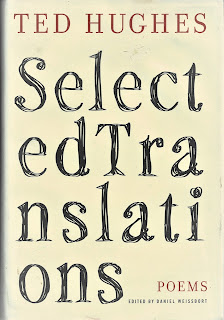Ted Hughes: "Selected Translations. Yehuda Amichai"
Yehuda Amichai
Yehuda Amichai ( 1924— 2000) was born in Wurzburg, Germany, into an orthodox Jewish family, and emigrated to Palestine in 1936. He served with the Jewish Brigade in the British Army during World War II, and as an infantryman in the Palmach, the elite strike force, in the Israeli War of Independence, as well as in two other Israeli wars (1956 and 1973). He studied Hebrew literature and the Bible at the Hebrew University, and he taught these subjects in teachers' seminars at the Hebrew University school for foreign students. Amichai frequently visited the US as a visiting poet and lecturer. He was honoured nationally and internationally, being a recipient of the Israeli Shlonsky, Brener, Bialik and Acum prizes and others. He had honorary degrees from the Hebrew University, Tel Aviv University, the Hebrew Union College and the Weitzman Institute, and was a Distinguished Associate Fellow of the American Academy for the Arts and Sciences. Amichai published many collections of poetry in Hebrew and more collections in English translation, probably, than any other contemporary non-English poet. He also published fiction and plays.
Amichai gave readings in many countries, including the UK, for instance at the first Poetry International in London, directed by Ted Hughes, in 1967.
Ted Hughes collaborated with him on three collections: Selected Poems (1968; with Assia Gutmann), Amen (1978) and Time (1979), the latter two translated with Amichai himself. In the last year of his life, Hughes and the present writer collaborated on a selection of 'the best' of Amichai's poetry in English translation (Faber, 2000).
It has become apparent that Amichai's was a distinctly modern literary enterprise, both in content and in language; as he put it in 'National Thoughts' (see below), 'The language which described God and the Miracles, / Says: / Motor car, bomb, God.' He draws from diverse historical stages of the language, from classical or Biblical Hebrew, through that of the Spanish Golden Age (see 'Ibn Gabirol', below; Hughes attempted, with Assia Gutmann, to translate some poems by Solomon Ibn Gabirol, 1021/22—c.1055, one of the greatest Hebrew lyric poets, who lived and died in Spain, into the contemporary colloquial). In 1982, Amichai was awarded the Israel Prize, the citation for which referred to 'the revolutionary change in poetry's language' that he had helped bring about. Though there is no Israeli laureateship, Amichai was closest to being the nation's poet, in a practical sense as well, as we have seen, in that he was among the foremost creators of the modern Hebrew language.
In a 1992 interview, he remarked of himself: 'I am, in a way, like the State of Israel — I have a poem which says, "when I was young, the country was young" . . . My personal history has coincided with a larger history. For me it's always been one and the same.'
Hughes got to know of Amichai's work in 1964, when the first issue of Modern Poetry in Translation was being prepared. An English-language poet living in Israel, the late Dennis Silk (see 'Dennis was Very Sick', below) submitted a few versions of Amichai's poetry which subsequently appeared in the first issue of MPT. Hughes shortly after began to work on more poems with Assia Gutmann. It was these translations that comprised Amichai's first book in English. As Hughes wrote later: `[Amichai is] the poet whose books I still open most often, most often take on a journey, most often return to when the whole business of writing anything natural, real and satisfying, seems impossible . . . The effect his poetry has on me is to give me my own life — to open it up somehow, to make it all available to me afresh, to uncover all kinds of riches in every moment of it, and to free me from my mental prisons.' There was a particular affinity between the two poets (see Appendix 6 for excerpts from letters between Hughes and Amichai).
About his translations, Ted Hughes, in his Introduction to Amen, remarked that what he wanted to do was to 'preserve above all [. . .] the tone and cadence of Amichai's own voice speaking in English, which seems to me marvellously true to the poetry. . Amichai supplied Hughes with English versions, which Hughes revised, often quite minimally. They met several times and corresponded, but apparently their consultations were as often verbal, on the phone.
Hughes saw Amichai as the 'chief character in a drama', the drama of his own life, which of course is intimately linked to the life of a new nation, ancient as that new nation may be. As he quite frequently remarked, he was more drawn to Amichai's poetry, even if he had access to it only through translation, than to that of any other contemporary writer. At one point he said that he was even beginning to study Hebrew. Amichai functioned, it seems to me, as a kind of guide for Hughes through the Biblical lands. Amichai tells the story of himself, but the context, a historical one, remains quite impersonal.
Hughes was intrigued by this double aspect of the Israeli poet's work.
The poems below are all taken from Selected Poems (Faber, 2000), though they first appeared in earlier collections.
Còn tiếp


Comments
Post a Comment